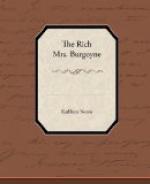“Oh, I don’t know.” Barry opened the front door again, and they stepped out to the porch. “Altogether,” he said vaguely, snapping dead twigs from the heavy unpruned growth of the rose vines, “altogether, I wouldn’t go into it without ten thousand. Five for the new presses, say, and four to Rogers for the business and good-will, and something to run on—although,” Barry interrupted himself with a vehemence that surprised her, “although I’ll bet that the old Mail would be paying her own rent and salaries within two months. The Dispatch doesn’t amount to much, and the Star is a regular back number!” He stood staring gloomily down at the roofs of the village;
Mrs. Burgoyne, a little tired, had seated herself on the top step.
“I wish, in all seriousness, you’d tell me about it,” she said. “I am really interested. If I buy this place, it will mean that we come here to stay for years perhaps, and I have some money I want to invest here. I had thought of real estate, but it needn’t necessarily be that. It sounds to me as if you really ought to make an effort to buy the paper, Barry, Have you thought of getting anyone to go into it with you?”
The man laughed, perhaps a little embarrassed.
“Never here, really. I went to Walter Pratt about it once,” he admitted, “but he said he was all tied up. Some of the fellows down in San Francisco might have come in—but Lord! I don’t want to settle here; I hate this place.”
“But why do you hate it?” Her honest eyes met his in surprise and reproof. “I can’t understand it, perhaps because I’ve thought of Santa Paloma as a sort of Mecca for so many years myself. My visit here was the sweetest and simplest experience I ever had in my life. You see I had a wretchedly artificial childhood; I used to read of country homes and big families and good times in books, but I was an only child, and even then my life was spoiled by senseless formalities and conventions. I’ve remembered all these years the simple gowns Mrs. Holly used to wear here, and the way she played with us, and the village women coming in for tea and sewing; it was all so sane and so sweet!”
“Our coming here was the merest chance. My father and I were on our way home from Japan, you know, and he suddenly remembered that the Hollys were near San Francisco, and we came up here for a night. That,” said Mrs. Burgoyne in a lower tone, as if half to herself, “that was twenty years ago; I was only twelve, but I’ve never forgotten it. Fred and Oliver and Emily and I had our supper on the side porch; and afterward they played in the garden, but I was shy— I had never played—and Mrs. Holly kept me beside her on the porch, and talked to me now and then, and finally she asked me if I would like to spend the summer with her. Like to!—I wonder my heart didn’t burst with joy! Father said no; but after we children had gone to bed, they discussed it again. How Emily and I prayed! And after a while Fred tiptoed down to the landing, and came up jubilant. ’I heard mother say that what clothes Sidney needed could be bought right here,’ he said. Emily began to laugh, and I to cry—!” She turned her back on Barry, and he, catching a glimpse of her wet eyes, took up the conversation himself.




